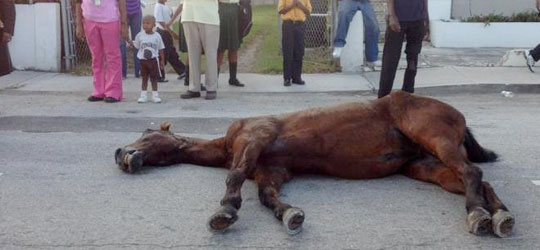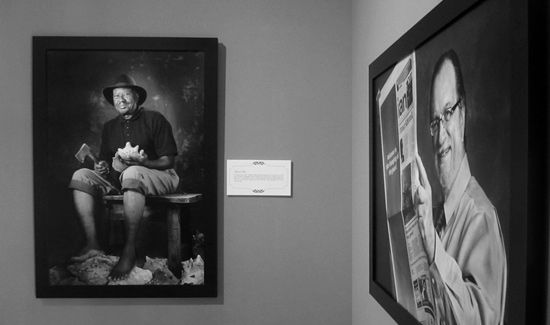
Animal cruelty is not just heartbreaking, it is bad for business and for The Bahamas
During the past week, two incidents involving surrey horses occurred that force us to face how we handle surrey horse operations in Nassau. On November 7, a surrey horse collapsed and died on busy Dowdeswell Street as onlookers gasped in disbelief and horror. Two days later, November 9, on the same street, another horse, so emaciated and weak it could no longer pull the carriage, rolled back into a car.
The report that was called in to me by a frantic onlooker said police yelled to the driver of the surrey to stop blocking traffic, prompting him to get out of the carriage and whip the horse until he could force it, on spongy, spindly legs, to move a step or two. Again, onlookers were horrified. The person who reported it was near hysteria from witnessing the cruelty. Word spread like wildfire on the internet.
A petition to stop surrey horse operations altogether gained momentum. Bahamians living abroad listened to talk radio online and started calling home, begging The Bahamas they left but still loved, to wake up and face reality: Animal cruelty is not just devastating and heartbreaking, it is bad for business and bad for The Bahamas.
We cannot state for certain that every surrey horse is abused or neglected and do not imply that every owner is heartless. Until an autopsy is completed on the death of the first horse, which was 22 years old, we will not know whether there was cruelty or if it was old age that caused the horse to collapse. We do know that the horse in the second incident, which happened about 48 hours after the first, was emaciated. We do know that what seemed like a traditional tourist experience, to see an island by horse and buggy, half a century ago when the pace was slower, can no longer be run the way it was then if it is to continue at all.
Surrey horses cannot prance as they did 50 years ago when there was little traffic on the streets, when they were not surrounded by buses and trucks, breathing noxious exhaust fumes, when they did not have to ‘perform’ in temperatures so hot that you could boil an egg on a city sidewalk because the pressure did not exist to capture every cruise passenger before they found something else to do.
The Ministry of Transport and the Ministry of Tourism have tried to bring order to the operation of surrey horses. There are regulations and inspections. There is a required two-hour rest period. But if the holders of the licenses and the owners of the horses do not have the heart to feel the pain and suffering, if their bottom line to earn a few dollars is greater than the bottom line of the reputation of the country they say they care about, then there is little anyone can do to convince them that neglect and cruelty hurt.
Can the surrey horse continue to operate as an attraction? I believe it can under entirely new stipulations and provisions. We have examples to look at. Horse and carriages operate successfully in New York, but only in Central Park, not on city streets. They are a major attraction in Charleston, operating with equipment that is majestic and horses so well cared for they add pride, dignity and beauty to the historic city.
Here is how I think we can salvage the experience, first by putting a swift end to the practices of animal neglect and abuse, and, secondly, by re-inventing the experience, probably including all new horses and most definitely new carriages.
Under a new system, every operator should be mandated to demonstrate knowledge of care, financial capability for care and be fully insured to be licensed. That takes political will. At specified intervals, retention of license should be dependent upon proof of care including 3-times annual worming, floating (trimming) of teeth, proper shooing and hoof care. Experts say that a horse can look like it is starving not because food is not provided but because its teeth have not been filed or it has an abscess, making it difficult to eat because it is just too painful. If feet are not trimmed every six to eight weeks, a horse can have difficulty walking. If its hooves are not maintained, if shoes are not professionally nailed by a blacksmith, feet can become infected or so sensitive to the pavement or rocks on the road that every step aches.
Finally, we need to develop new hours of operation and routes away from city traffic except perhaps on Sunday afternoons when bus and truck traffic is minimal. Many years ago, we at the Nassau Tourism & Development Board worked with the Bahamas Humane Society and devised routes that covered Cable Beach and Paradise Island from 8-11 am and again from 4-9 pm. The Cable Beach route was particularly attractive because it included the Botanical Gardens, Ardastra Gardens, the hotel strip and a stop at Arawak Cay with a trough for the horses there and bedding for them for the evening at the Humane Society. It made stopping for a conch salad a business opportunity for vendors and a photo opp for visitors.
A horse is not a machine. It is a living, breathing soul that must be cared for and we must care for ours if The Bahamas is not to suffer at the hands of world opinion for the animal abuse and cruelty that has now been exposed internationally. The clock is ticking. We can no longer pretend that the way we once did business will work today when news spreads as it happens. We can do better and with the right planning, investment and care, we can re-create the surrey horse experience.
Sometimes bad things happen for a good reason.
Diane Phillips


